I know what sisterhood feels like, but I am not talking about what siblings should share. This is something deeper because it is a connection that exists among women regardless of biological relations. “Blood thicker than water,” they say in Belize, but sisterhood like this sometimes actually exemplifies what those who share DNA should have. It is that kind of bond that makes you feel safe. You can trust that you will not be betrayed or disappointed. And what makes it so special is that it isn’t obligatory. It’s not there because it is “supposed” to be there. It is there because it is meant to be there, like maybe it was there from lifetimes before, a commitment made in a time and place that pre-existed this one. Whichever way it happens, this kind of connection is powerful, and it is this kind of connection that gave birth to this story.
The first time I met my “Sistren” was at a women’s fair that was quite likely held during Women’s Month at Memorial Park in Belize City. This was in the late 90s and I saw so many beautiful products made by women from across the country. I was very impressed to see what women were producing, and I was glad that this event had been organized. I must have visited all the booths that day and quite likely said at least a greeting to all the women who were present. I recall handmade greeting cards and jewelry among the items that caught my attention. Like I said, I was impressed by the tremendous creativity, and the vibes were just so positive and uplifting! My interaction with her wasn’t lengthy, but I appreciated the time she took to answer my questions and how sincere and pleasant she was.
I wouldn’t meet her again until several years later. By that time, I had become more involved in activist work, having interacted with other women who were doing things for women – organizing, educating, and seeking change. I greatly admired such women. They inspired me. I had already made a name for myself in journalism and had moved away from Belize City to the more quiet and cozy coastal town of Dangriga in southern Belize. I wanted to use my skills to highlight the positive things that were happening in this town. Too many times, the stories coming out of Dangriga were of crime and violence. I wanted to change that. I was also concerned that for a time there was no Women Development Officer assigned to this town. I had introduced myself to the one who was here when I had just moved to Dangriga. I was willing to support whatever she was doing for women, and I wanted to showcase it in my work as a journalist. Not long after I met her, she was transferred, so no one was doing work for women, providing skills training, organizing, or empowering.
Eventually, I heard a new officer had been hired, and I wasted no time to head to the office and introduce myself to this person. I walked in and met this very friendly, respectful, down-to-earth woman with locs. I had met her before. I didn’t remember then about the event at the park in Belize City, but I remembered her coming to buy African print fabric at House of Africa in Dangriga while I was there. She was such a lively, vibesy person. Her positive energy resonated with me, so when I walked into her office a couple of years later, I was quite pleased that she was the person who would be working with and for women here in the south. I told her about my work as a correspondent with Love FM and volunteered to assist her in any way I could to do her work for women. I didn’t know it then, but I was meeting my sister-friend, my Sistren Michele Irving. It would be the start of, or maybe the continuation of, a lifelong relationship of empowerment and support.
We would organize many activities together and attend many meetings to improve the quality of life of women in our community. We had gotten involved in the Dangriga HIV/AIDS Society and PASCA (Proyecto Accion Sida de Centro America – the Project for AIDS Action of Central America) who were preparing to start a project in Dangriga that would address the feminization of HIV/AIDS. The statistics showed that it was primarily women who were being infected, affected, and dying of HIV/AIDS. PASCA would support an initiative that would tackle that issue, and so we were at those meetings sharing our ideas of how we could help women in our community deal with HIV/AIDS. We devised the strategy that women could be taken on a retreat away from the community, a quiet place. They would be educated about HIV/AIDS and how to avoid getting infected, but not only that. We believed women could not truly protect themselves if they did not feel empowered enough to take control of their lives and well-being. The retreat needed to include self-esteem building and assertiveness. It also had to provide practical skills for women to negotiate condom usage in their intimate relationships. Because this approach would focus on women’s empowerment, we suggested the name “Powa fu Women” for this project, and it was accepted. It also factored in that women were the primary caregivers for their children, and so any initiative that would take women out of their homes also needed to accommodate their children. The project allowed for daycare services to be provided at the retreat location so that having responsibility for their children would not be a deterrent to women being able to benefit from the project.
There would be three retreats held that would target 25 women each time so that by the end of the project, 75 women would have benefitted. Each cycle of the project would include a retreat and two follow-up sessions. My Sistren and I would be involved from the planning stage to its execution and completion. We facilitated sessions at the retreats – she did assertiveness and I did self-esteem. She made the huge verandah of her office available for the follow-up sessions that would be held on a Saturday or Sunday late afternoon until all three project cycles were completed.
It was at the last follow-up session that the question was raised, “What will we do now?” The women had grown accustomed to coming to these gatherings where they could talk about their life experiences and challenges. They were able to share what they understood from the retreat, what they were able to put into practice in their personal lives, and what challenges they were facing. They could seek clarification on any topic that they did not grasp well at the retreat, and essential points were reiterated. Eventually, though, the women did not just want to talk about what they were learning. They wanted to discuss other issues that were also affecting them, so we all agreed to keep meeting right there on the verandah of the Women’s Department in Dangriga.
Our meetings became frequent, and our discussions continued to be informative. The women were interested in discussing issues such as sexual and reproductive health, their rights, other health issues, parenting, gender-based violence, and the wide spectrum of social issues that were affecting them. We invited guests to speak with the group, whether they were visiting students from abroad or colleagues working with other non-government or government agencies – the Belize Family Life Association (BFLA), led by Joan Burke, for example, was one of our most supportive partners. Essentially, these “powaful” women wanted to be more knowledgeable, they wanted to be more active in the community, and they wanted to take charge of their lives.
We started to do outreach in the community, particularly regarding HIV/AIDS and gender-based violence. We would set up satellite tables at critical areas in town where we could do condom demonstrations and distribution as well as educate our people about HIV/AIDS and other sexually transmitted infections. We visited schools, did public presentations and participated in major events like the Independence Day and Garifuna Settlement Day parades when people would be out in large numbers in Dangriga. We created an event called “Women’s Night Out,” where we would take over a local club, decorate it, get small gifts to give away and arrange performances highlighting issues such as gender-based violence and child abuse. The night out included games or “edutainment” activities that engaged the audience, taught them about condom usage, shared poetry, songs, and drama that addressed these social issues, and just made people more aware of them in an enjoyable, creative atmosphere. A big plus with this approach was that even though it was called “Women’s Night Out,” it had a high level of male participation, which allowed POWA to impact males who would otherwise never attend a meeting or workshop on these same topics. We would take our outreach to where the men congregated in the town playing dominoes so they could benefit from the information we were sharing, especially about HIV/AIDS and gender-based violence. We also did condom demonstrations and distribution in those spaces. We also did house-to-house campaigns to share information with the community in the comfort of their homes and neighborhoods.
“Powa fu Women” became a buzz phrase, not just in Dangriga but in other parts of the country as well. People were interested in this group of women who were vibrant and unafraid to speak openly about HIV/AIDS and GBV without reservations or sugarcoating the harsh realities women were facing. Within a year after the project that started it all came to an end, we had become an entity in and of ourselves. We had designed these bright yellow t-shirts with a red ribbon on the front and the words “Powa fu Women” written within the ribbon. We had sewn bags with the ribbon and those words and used them for outreach activities. Once you saw a Powa woman with that bag, you could be sure it contained brochures, condoms and other items needed to educate the community. We decided to create our own name that would maintain the “powa,” which, for us, signified our empowerment of ourselves, our families, and our community. One Sunday afternoon, while I was visiting with my Sistren, we came up with the name the Productive Organization for Women in Action (POWA) and designed a logo that would capture the scope of our work. We had expanded beyond a project that sought to address the feminization of HIV/AIDS in southern Belize. We were actively involved in educating, advocating for, mobilizing, and empowering our community, not just about HIV/AIDS but so many other issues that were plaguing our society.
We partnered with the Belize Family Life Association for numerous outreach activities. That type of collaboration would remain a consistent part of our community work over the years. We remained open to partnerships with local and international organizations to serve our community. We conducted summer programs with young people in Dangriga and surrounding communities and continued to do school visits highlighting self-esteem and awareness about sexual and reproductive health. So impactful was our work that we were granted the UNAIDS Red Ribbon Award, and with that grant, we were able to send several of our members back to school to complete their secondary education. One member even went on to junior college.
I remember being quite upset when my Sistren told me her office would be relocated. The place where I had gone to meet her the first time was near the Barmouth – where the North Stann Creek River meets the Caribbean Sea – and this place was very spacious. It was once a popular and locally owned hotel, so it was also quite perfect for the kind of activities that were held at the Women’s Department, such as training workshops. I had painted a beautiful curtain there once that captured the rising full moon over the sea while the sun was just setting and left an unforgettable lavender hue in the sky. The notion of us not having this peaceful, inspiring space anymore was disconcerting, but there would be a Divine purpose for this move that I didn’t realize until afterward.
It turned out that just when the office was relocated, I decided to go back to school, and so did my Sistren Michele. The new office location was near the junior college, making it easy for us to do our community work through the Women’s Department while attending classes. We were able to study and do assignments together. The office provided much-needed support for us as we pursued higher education. It was at this new location that POWA was born, and it provided a supportive space not just for my Sistren and me but also for several of our members who had also returned to the classroom to complete or further their studies. I recall many days and nights of study sessions and completing assignments even as we continued organizing and mobilizing.
I eventually left the country to attend university in Jamaica, and the women of POWA were very supportive of me. The organization continued to be active in the community, and I was involved even while I was away studying. Whenever I came home for the holidays, I would be a part of some outreach activity or the other. It was so inspiring to see how impactful POWA was becoming, not just in the lives of our members but also in our community. POWA had become a household name, and once we organized any event, it was sure to be well-attended.
“POWA da love” became a popular statement because people felt loved and appreciated when working with these women. There’s a feeling of connectedness, respect, and appreciation that emanates from anything we do. I can confidently say I know what sisterhood feels like from being in this organization, and the core of that positive energy rests with my Sistren Michele. She gives her love, her care, her knowledge, her creativity, and her strength sincerely, consistently, and unconditionally. She exemplifies sisterhood and that has fueled POWA to have the impact it has had since its inception back in 2003. We see each other through the tough times and the great times. We are there for the losses as well as for the gains.
POWA now has a center that we manage in our community. It is a space for us to meet, conduct training, hold small events, and offer service to our community. We have a counseling room, a furnished kitchen, and an office space. We want to expand this facility so that we can do more for the community, especially for women and girls. In fact, we established our youth arm, Girl POWA, in 2011 to engage and empower girls through cultural preservation. Our girls became a regular feature of Garifuna Settlement Day activities singing traditional Garifuna songs on the riverside as the re-enactment of the arrival of the Garinagu was taking place. We have also started a small business, POWA Oils and Soaps, that can help sustain the work of the organization. Our current efforts are directed toward improving our products and getting them out in the region and the world. The future of our organization is bright because our women continue to shine their light in their own lives and in the work they do for the community with and through POWA. Furthermore, many of our girls from Girl POWA have their own success stories from being involved in this organization. They are the present and future of POWA.
To recall this journey has been a joyful experience, and to see what it has resulted in over the course of 20 years is fulfilling. It is all a result and accomplishment of true sisterhood. I did not know, had no way of knowing, what the future would hold from my encounter with a “powaful” woman such as Michele Irving, but I am certain that it had a Divine purpose. The Divine Mothers had ensured that these particular women would meet, and they saw to it that the roads would be open for us to do the work that we were meant to do together. They wove the thread that would connect us, and they empowered us to overcome the challenges that sought to discourage us but really served to strengthen our resolve. We give great thanks for their oversight and support in keeping this POWAful story alive to inspire and empower women, girls, and the community for many more years, perhaps many more lifetimes, to come.
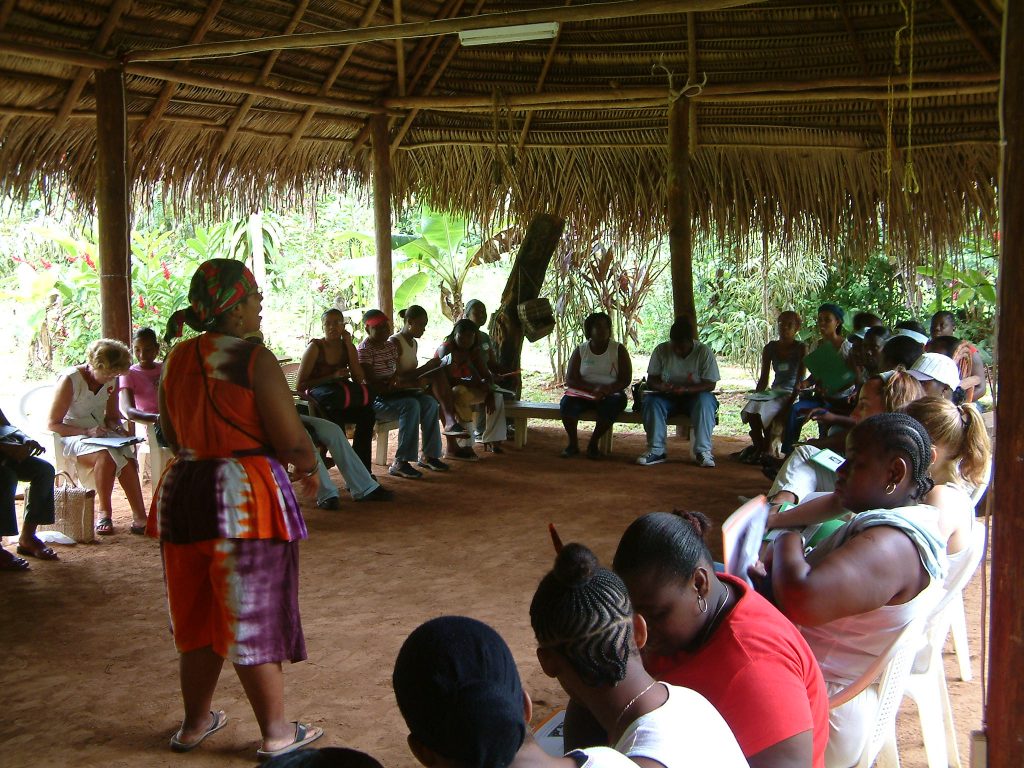
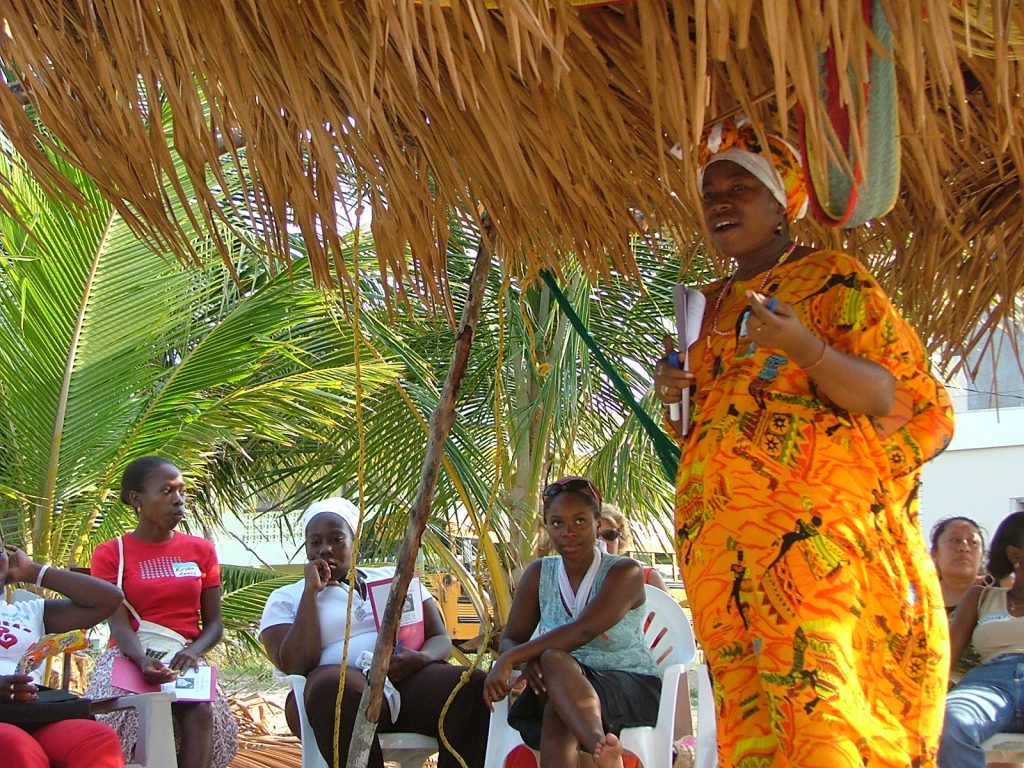
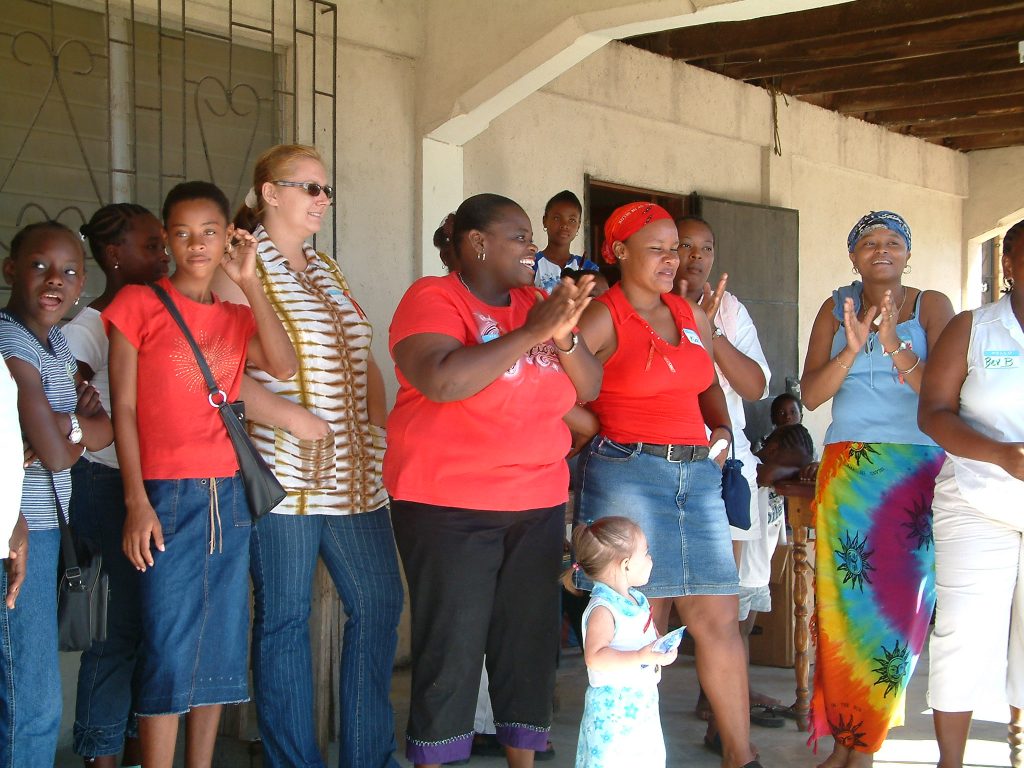
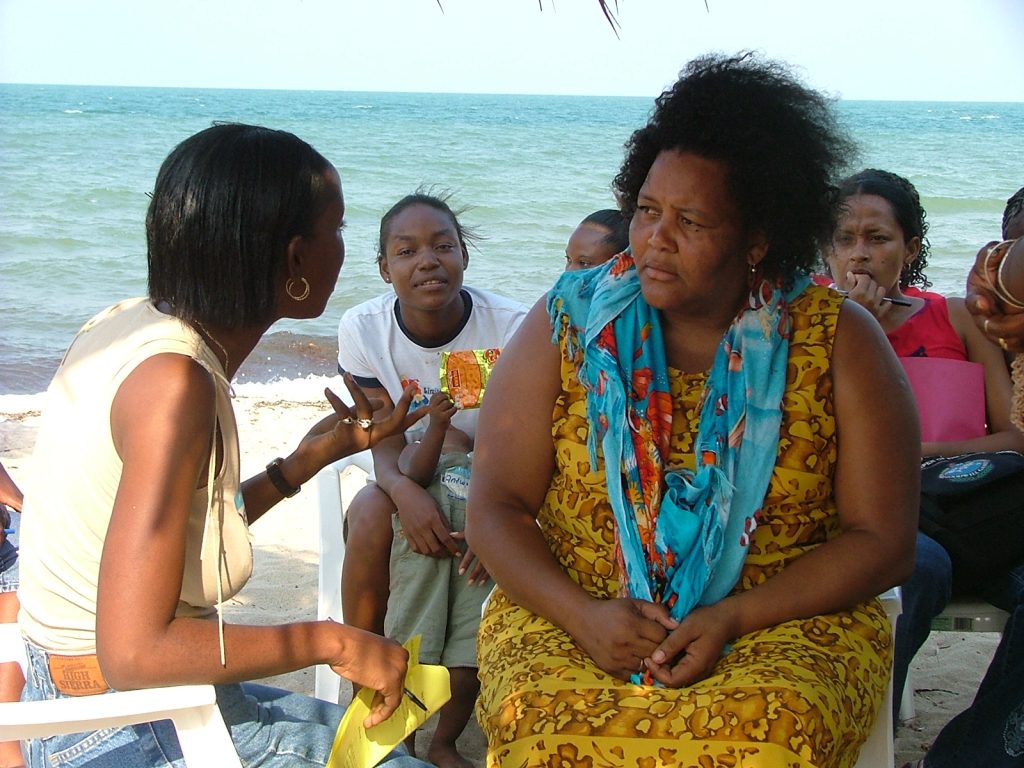
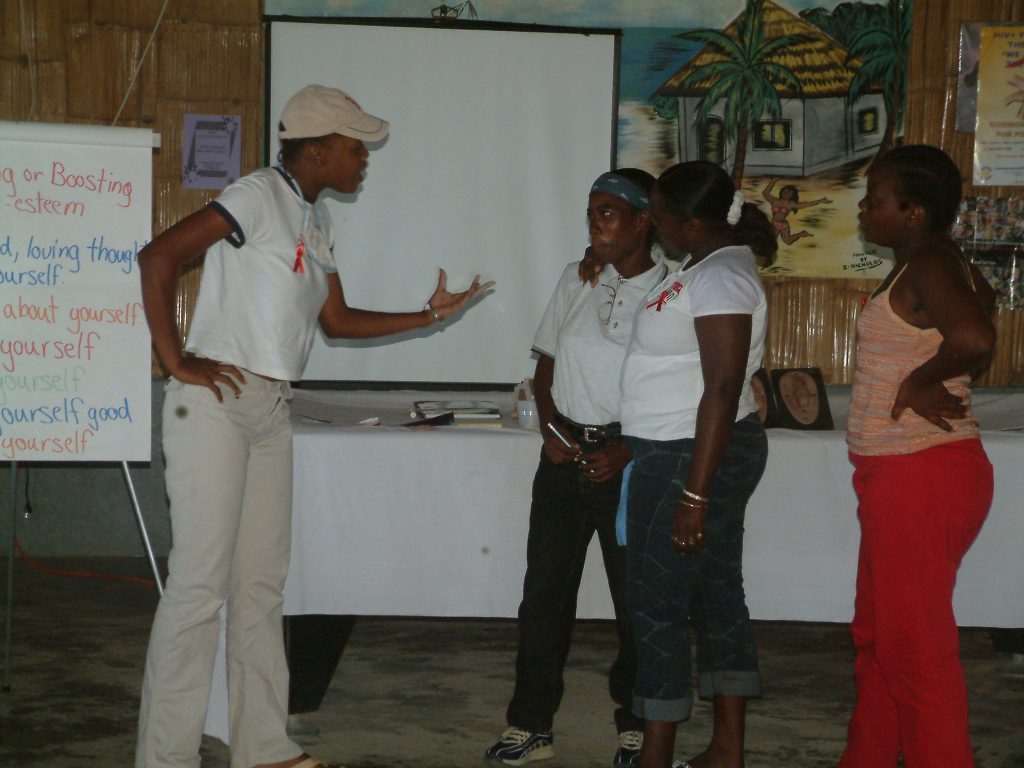
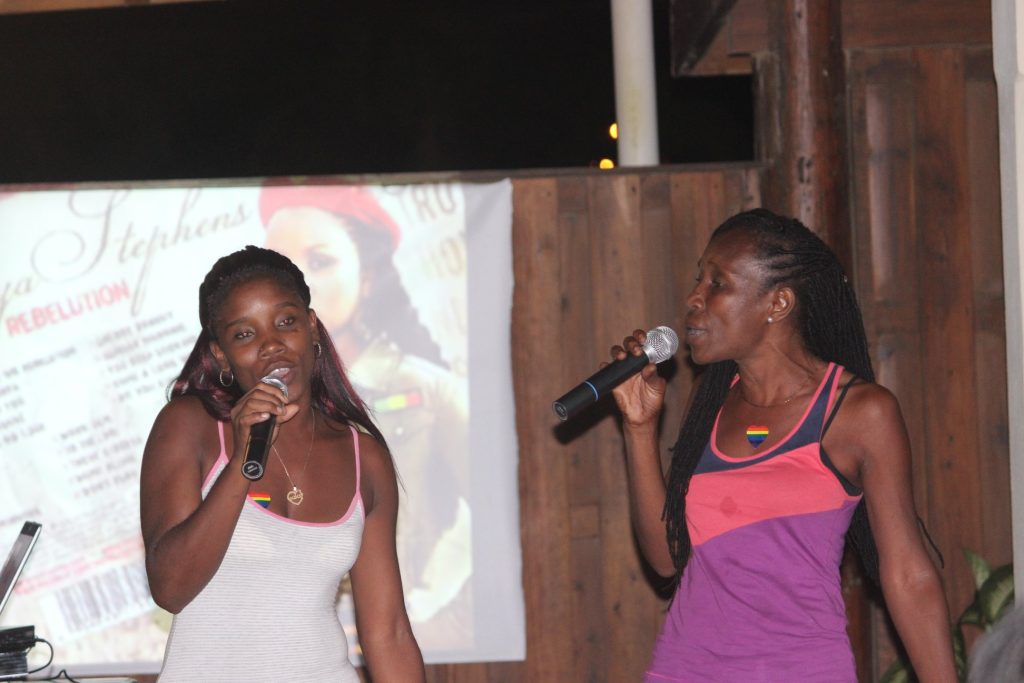
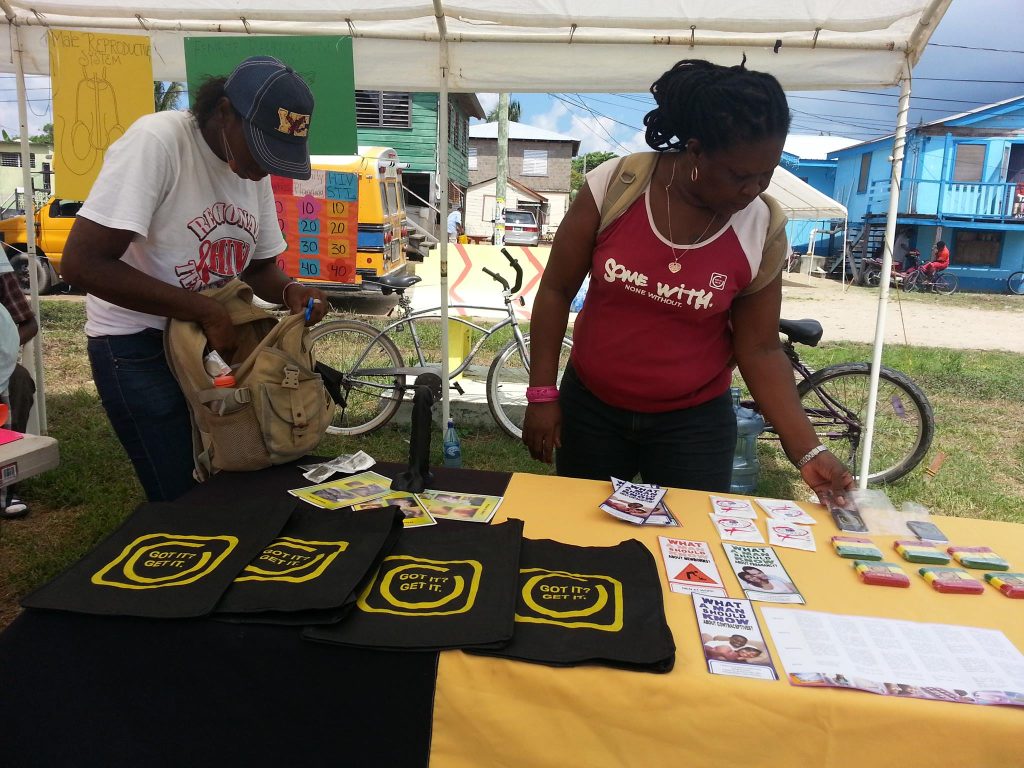
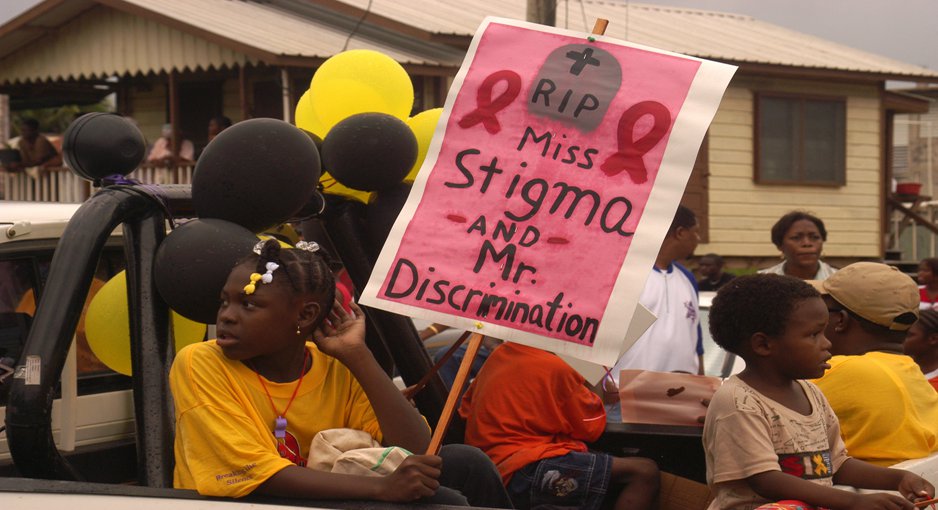
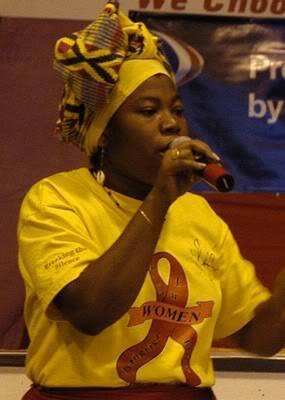
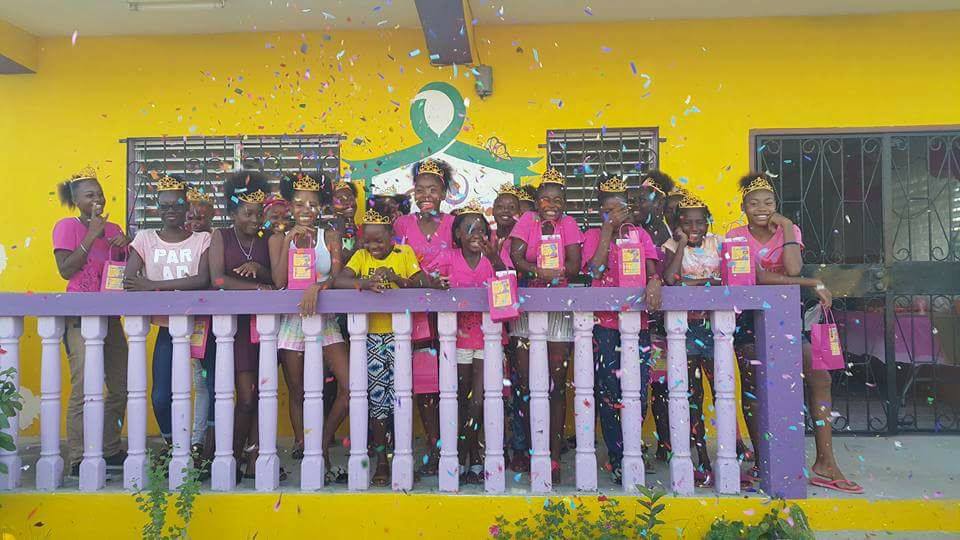
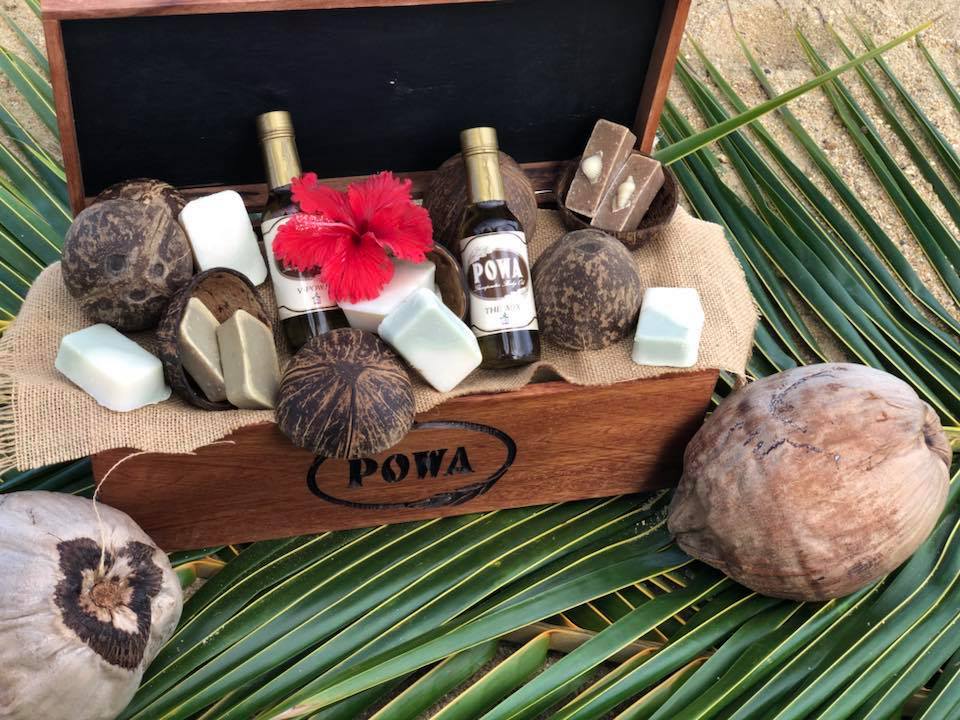
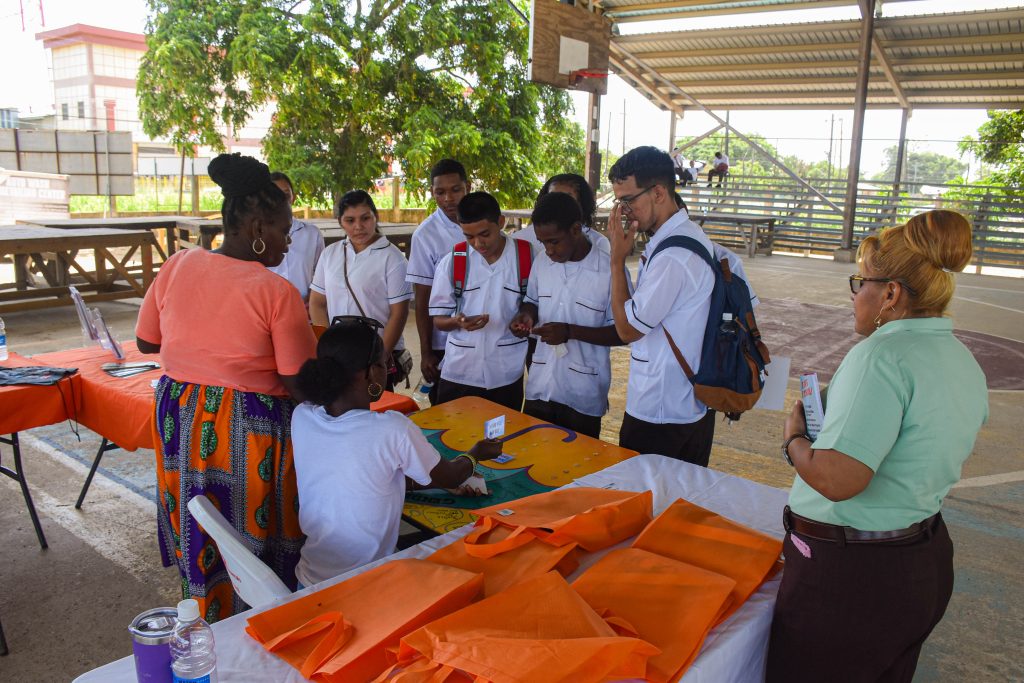
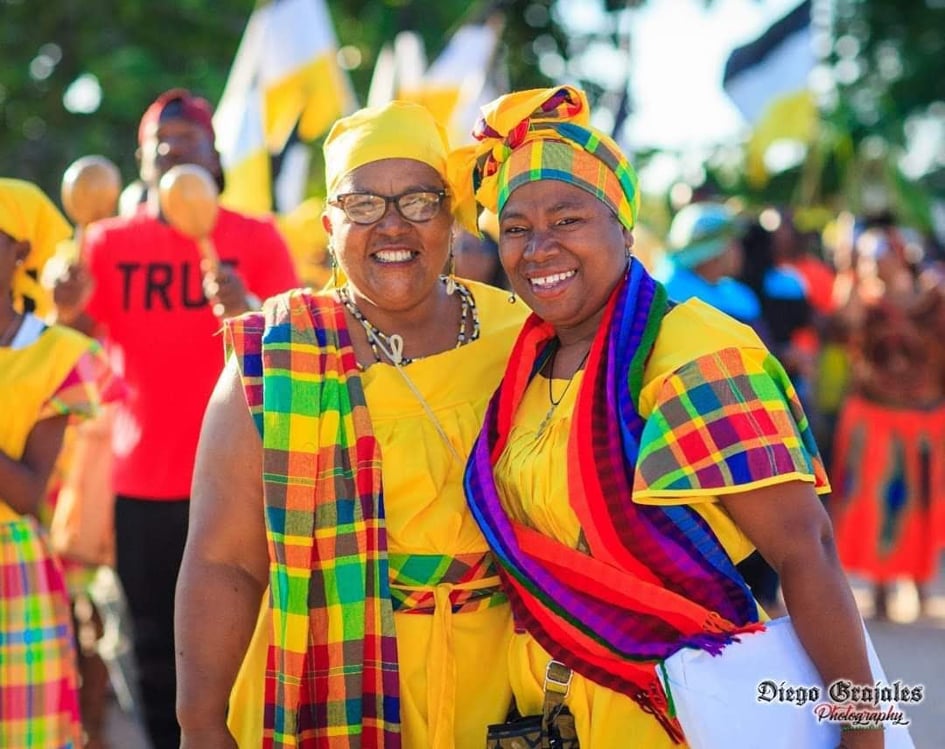
All photos by author.
Author Biography
Ifáṣínà Efunyemi is a Garifuna woman, human rights defender and advocate, educator, journalist, writer and poet from Belize. She has been in advocacy and volunteerism since age 14 while in high school at St. Catherine Academy and has continued on her path of being the voice of the voiceless through her involvement in numerous civil society organizations in Belize. Her advocacy work focuses primarily on women and youth empowerment, sexual and reproductive health and rights, gender-based violence, human rights, and cultural preservation. She was a co-founder of the Dangriga HIV/AIDS Society. She was instrumental in developing and implementing the Powa fu Women project, which was designed to respond to the feminization of HIV/AIDS. Her involvement in this project in 2003 led to her later co-founding the Productive Organization for Women in Action (POWA) which remains active in educating and empowering women and the broader community through HIV/AIDS education and outreach as well as addressing gender-based violence, sexual and reproductive health, human rights and other issues.
She holds a BA in Media and Communication from the University of the West Indies and is pursuing an MA in Media Ethics and Social Change from the University of Sussex. She lectures at Stann Creek Ecumenical Junior College on Belizean History, Caribbean Studies, Research Methods, Ethics, and Business Communication.
